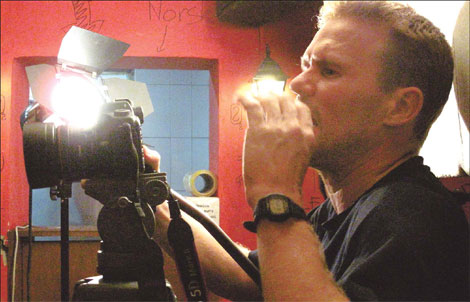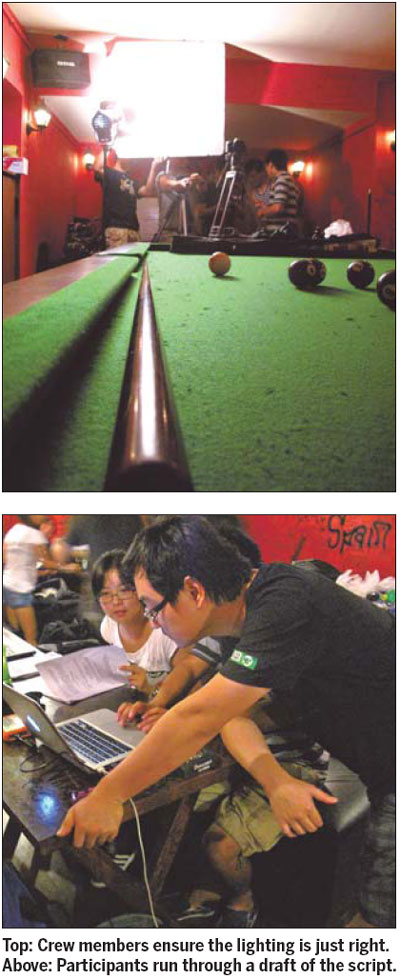Culture
Making a movie in one weekend
By Thomas Leskin (China Daily)
Updated: 2010-08-04 11:42
 |
Large Medium Small |
 |
|
Filmmaker Jay Hilbert organizes his crew behind a camera. [Photos by Thomas Leskin / For China Daily] |

Beijing's one and only adrenaline fueled movie-making marathon, the 48 Hour Film Project, sparked a frenzy over the weekend with creativity on overload for everyone involved.
In its second year, the Beijing project, led by chief organizer Peter Sallade and held at the Ullens Center for Contemporary Arts in 798, offers amateurs and professional enthusiasts-alike the opportunity to take part in a competition with the focus on creating a masterpiece in only two days, including writing the script, filming and editing, all before the clock runs out at 9 pm Sunday.
While this project is locally based, it's part of a larger tour happening all over the globe. This past weekend, four other film projects also took place in the US and competitions have been running since March.
Films in Beijing that make the August 1 deadline will be shown at the UCCA on August 6, with the winner then competing in the finals - last year's competition was held in Las Vegas.
American Peter Sallade started the Beijing chapter of the 48 Hour Film Project last year, but his aim was not only to have foreigners creating one of a kind films in the city, but to also get Chinese filmmakers and actors involved, helping Chinese filmmakers in stepping out of the box. Another unique aspect in Beijing is that many teams are formed at the signing up stage of the competition, creating a well-balanced mix of Chinese and expats for a melting pot of ideas.
With only a limited amount of time in the project, a film is only as good as its team - eight turned in movies on time this year, mainly in the genres of comedy and drama - therefore, a strategy and the collaboration of every team member are needed to finish on time.
"It all depends on what you write," said Osric Chau, a professional actor. "We're going with the adrenaline of not knowing and that anything can happen at any time."
Filmmaker Jay Hilbert said that in last year's competition in planning their film, his team of 20-30 met to brainstorm after the kickoff event then stayed late into the night working on the script. Some of the crew later left, leaving the rest to finish the script, wasting valuable time.
"This year we're going to breakup into teams with each coming up with one idea, then the writing team gets to work," Hilbert said. "The next day we have a final say on the script and start filming."
After a night shift of script writing, the crew starts choosing locations and begins filming. From here on out, crews slowly lose consciousness with only their willpower to finish.
As scenes are shot, the action behind the scenes remains frantic. In any given second, costumes are created, crew members are rushing around locating props, actors change into persona and completed scenes are edited moments after shooting.
While the film crews are free to use any props, actors and locations available, there are still some limitations. In addition, films must be between 4-6 minutes long with every team including the same three elements, a character, prop and a line, which is distributed upon registering. This year's elements were a writer, sunglasses and the line "please give him the message".

One Fine Day at the Marriott Northeast by 7Horns is a tale of a villainous businessman preparing to leave China with his partner's money and his wife too. Other entries include Game Over, by the Beijing Short Film Group, which is about a society obsessed with their PSPs.
"This whole contest is about limitations, Chau said. "After finding out the three elements, the ideas are flowing away."